M4 nit 2 We have played football for a year now 课件(短语知识点和语法)
文档属性
| 名称 | M4 nit 2 We have played football for a year now 课件(短语知识点和语法) |  | |
| 格式 | zip | ||
| 文件大小 | 75.2KB | ||
| 资源类型 | 试卷 | ||
| 版本资源 | 外研版 | ||
| 科目 | 英语 | ||
| 更新时间 | 2021-10-08 17:39:44 | ||
图片预览

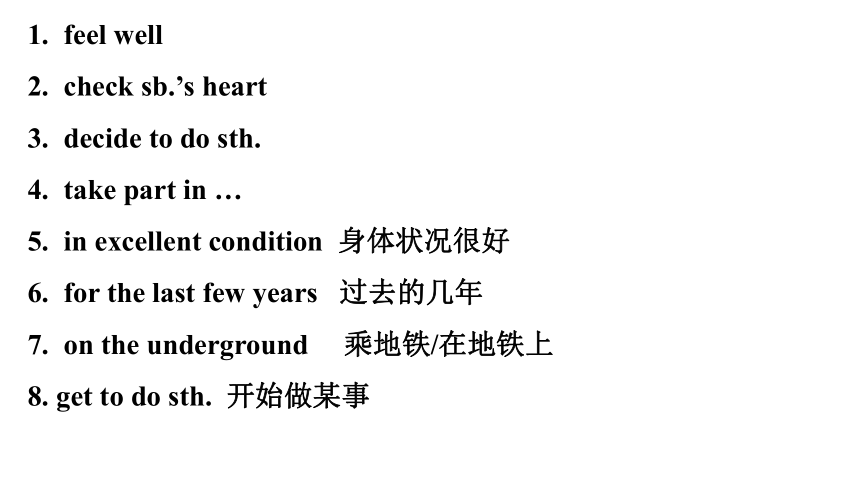
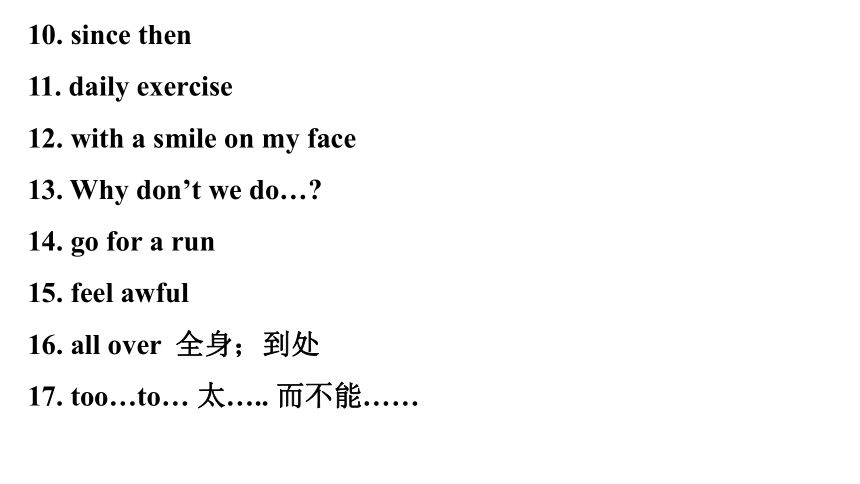
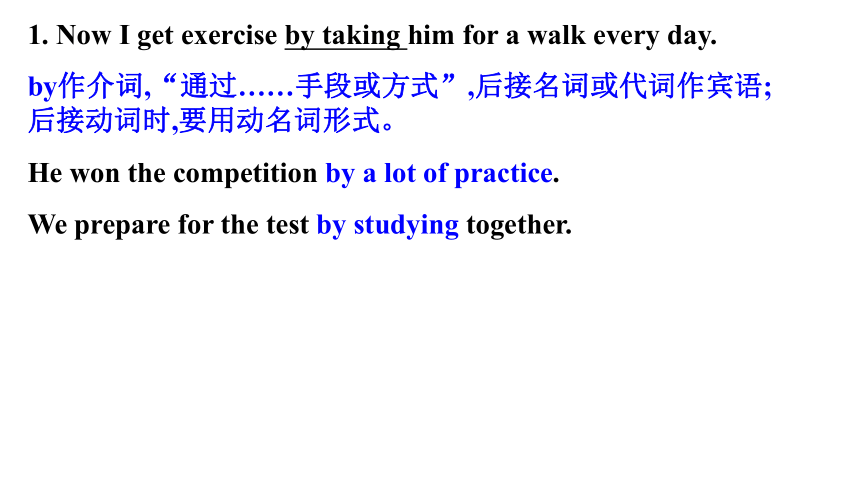
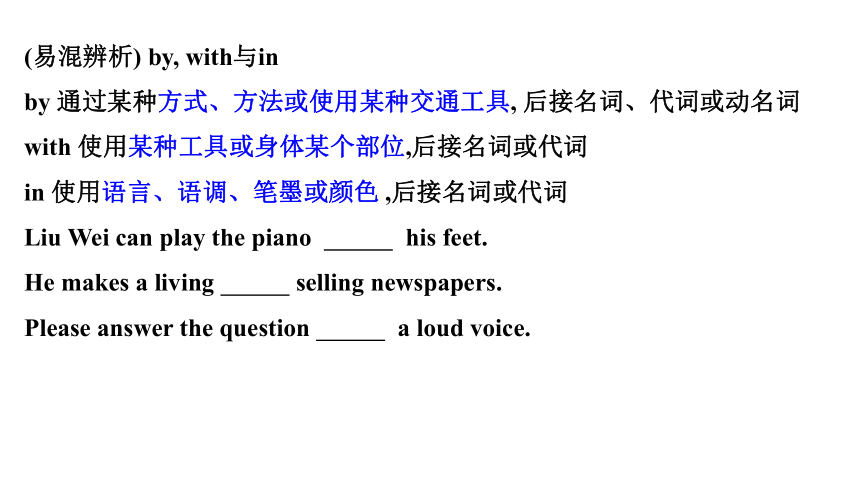
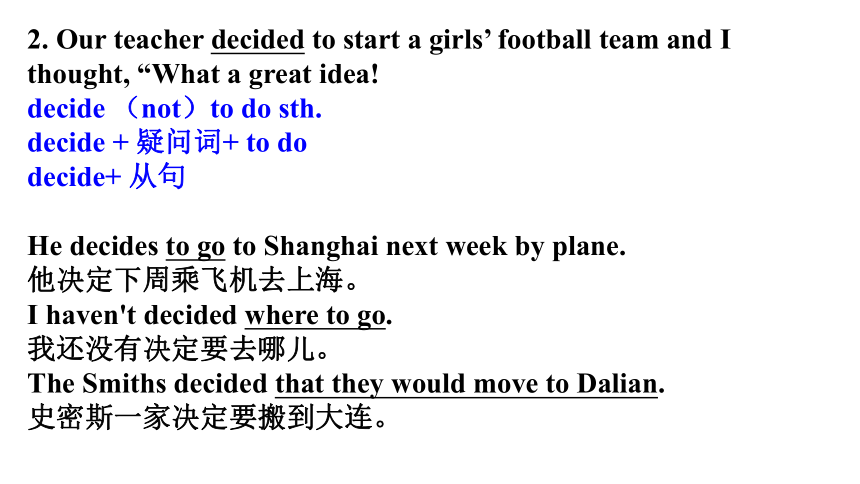
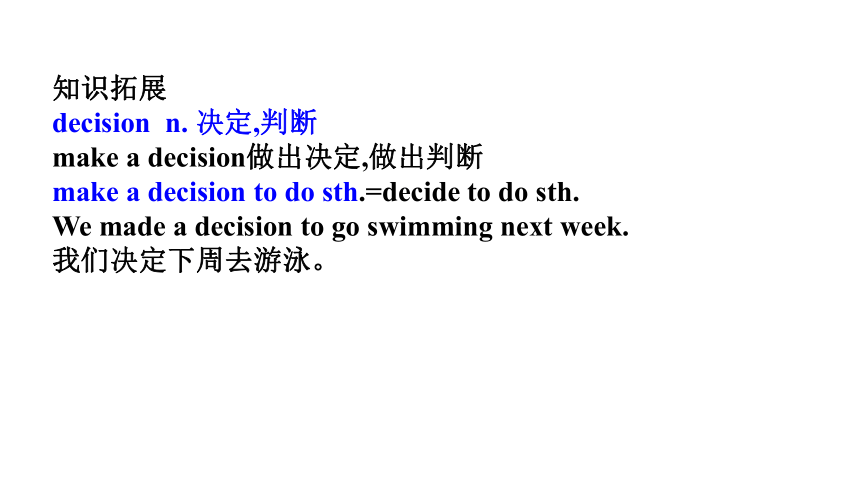
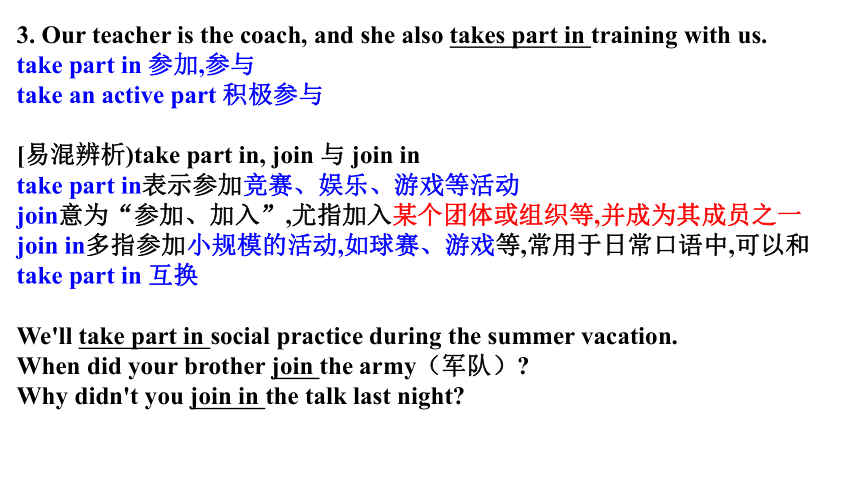
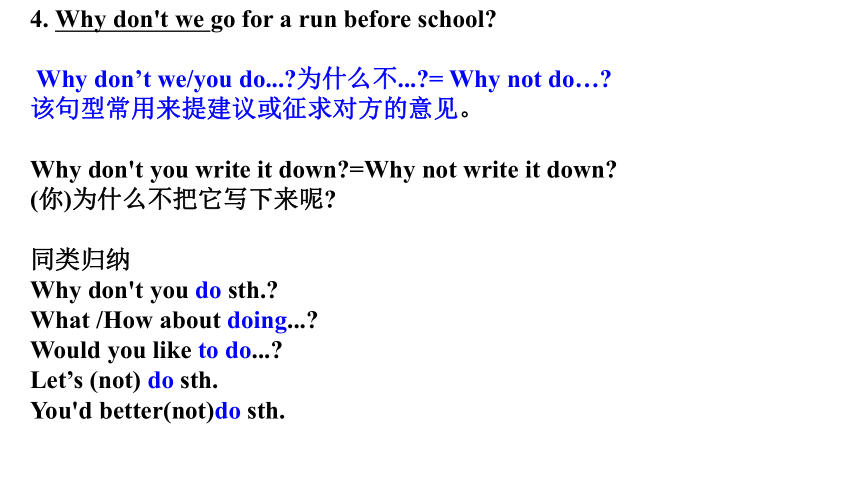
文档简介
(共21张PPT)
M4U2短语及知识点
feel
well
check
sb.’s
heart
decide
to
do
sth.
take
part
in
…
in
excellent
condition
身体状况很好
for
the
last
few
years
过去的几年
on
the
underground
乘地铁/在地铁上
8.
get
to
do
sth.
开始做某事
10.
since
then
11.
daily
exercise
12.
with
a
smile
on
my
face
13.
Why
don’t
we
do…?
14.
go
for
a
run
15.
feel
awful
16.
all
over
全身;到处
17.
too…to…
太…..
而不能……
1.
Now
I
get
exercise
by
taking
him
for
a
walk
every
day.
by作介词,“通过……手段或方式”,后接名词或代词作宾语;后接动词时,要用动名词形式。
He
won
the
competition
by
a
lot
of
practice.
We
prepare
for
the
test
by
studying
together.
(易混辨析)
by,
with与in
by
通过某种方式、方法或使用某种交通工具,
后接名词、代词或动名词
with
使用某种工具或身体某个部位,后接名词或代词
in
使用语言、语调、笔墨或颜色
,后接名词或代词
Liu
Wei
can
play
the
piano
his
feet.
He
makes
a
living
selling
newspapers.
Please
answer
the
question
a
loud
voice.
2.
Our
teacher
decided
to
start
a
girls’
football
team
and
I
thought,
“What
a
great
idea!
decide
(not)to
do
sth.
decide
+
疑问词+
to
do
decide+
从句
He
decides
to
go
to
Shanghai
next
week
by
plane.
他决定下周乘飞机去上海。
I
haven't
decided
where
to
go.
我还没有决定要去哪儿。
The
Smiths
decided
that
they
would
move
to
Dalian.
史密斯一家决定要搬到大连。
知识拓展
decision
n.
决定,判断
make
a
decision做出决定,做出判断
make
a
decision
to
do
sth.=decide
to
do
sth.
We
made
a
decision
to
go
swimming
next
week.
我们决定下周去游泳。
3.
Our
teacher
is
the
coach,
and
she
also
takes
part
in
training
with
us.
take
part
in
参加,参与
take
an
active
part
积极参与
[易混辨析)take
part
in,
join
与
join
in
take
part
in表示参加竞赛、娱乐、游戏等活动
join意为“参加、加入”,尤指加入某个团体或组织等,并成为其成员之一
join
in多指参加小规模的活动,如球赛、游戏等,常用于日常口语中,可以和take
part
in
互换
We'll
take
part
in
social
practice
during
the
summer
vacation.
When
did
your
brother
join
the
army(军队)?
Why
didn't
you
join
in
the
talk
last
night?
4.
Why
don't
we
go
for
a
run
before
school?
Why
don’t
we/you
do...?为什么不...?=
Why
not
do…?
该句型常用来提建议或征求对方的意见。
Why
don't
you
write
it
down?=Why
not
write
it
down?
(你)为什么不把它写下来呢?
同类归纳
Why
don't
you
do
sth.?
What
/How
about
doing...?
Would
you
like
to
do...?
Let’s
(not)
do
sth.
You'd
better(not)do
sth.
5.
My
legs
hurt
and
I
am
hot
all
over.
all
over浑身;到处
He
didn't
take
an
umbrella,
so
he
is
wet
all
over.
他没有带伞所以浑身都湿了.
all
over
the
world
全世界
6.
perhaps可能;也许
相当于maybe.
Perhaps
常位于句首,也可放句中。(位于实义动词之前,助动词、系动词或情态动词之后。)
Perhaps
they
are
in
need
of
our
help.
或许他们需要我们的帮助。
perhaps,
probably
与
possibly
perhaps
adv.可能;也许
,含有“或许如此、或许不如此”的含义.可位于句首或句中。
Perhaps
the
letter
will
come
today.或许这封信今天会到。
Probably
adv.
大概,可能性较大,比possibly语气强。常用于句中。
It
will
probably
rain.天很可能会下雨。
possibly
adv.可能,常和can,
may,
must等情态动词连用,比probably语气弱得多。
Leo
may
possibly
come
here.利奥可能会来这儿。
7
too...to...太.而不能......
too...to...意为“太
而不能·.”,其中too为程度副词,后接形
容词或副词原级,to是动词不定式符号,后面接动词原形。
I
was
too
excited
to
say
a
word.
too...to...结构与其他结构的转换
(1)too...to...可与so...that...结构互换,so后接形容词或副词的原级,that
后接从句,且从句要为否定形式。
The
article
is
too
difficult
for
me
to
understand.
=The
article
is
so
difficult
that
I
can't
understand
it.
(2)too...to...可与not...enough
to...结构相互转换
enough前的形容词或副词应是too后面形容词或副词的反义词;且enough...to...结构须用否定形式。
My
son
is
too
young
to
join
the
army.=My
son
isn't
old
enough
to
join
the
army.我儿子太小,不能参军。
8.
stop
doing
sth.
停下正在做的事
stop
to
do
sth.停下来去做某事
Stop
(eat)
fast
food.
It
is
harmful
to
your
health.
Stop
(get)
some
exercise.
It
can
make
you
in
good
condition.
eating
to
get
9.
no
one
没有一个人,no
one做主语,动词用单数。
No
one
has
been
to
Mars.
No
one
has
discovered
life
on
Mars.
No
one
is
ready
to
do
it.
10.
feel
well
well
adv.
好地
放在实义动词后
well
adj.
(身体)好的;放在be动词或者系动词后,相当于fine/good/fit
二、非延续性动词与延续性动词之间的转化
动词可分为延续性动词和非延续性动词。在现在完成时中,在和表示一段时间的时间状语连用时,应将非延续性动词转化为延续性动词。如:
I
have
bought
the
book.
(buy
为非延续性动词)
I
have
had
the
book
for
two
weeks.
(for
two
weeks为一段时间,故非延续性动词buy
(bought)转变为延续性动词have(had))
非延续性动词
延续性动词
leave
be
away
(from)
begin
be
on
buy
have
borrow
keep
join
be
in
die
be
dead
become
be
常见的需要转换的动词有:
四、短暂性动词转换为延续性动词
become
→
be
1.
I
became
a
teacher
in
2000.
I
________
__________
a
teacher
for
_________
_________.
2.
The
river
became
dirty
last
year.
The
river
_________
_________
dirty
for
_________
__________.
die
→
be
dead;
leave
sw.
→
be
away
from
sw.
3.
He
left
Fuzhou
just
now.
He
_______
________
________
_________
Fuzhou
for
five
minutes.
4.
My
grandpa
died
in
2002.
My
grandpa
_______
_______
________for
_______
________.
begin
→
be
on
5.
The
film
began
two
minutes
ago.
The
film
____
____
____
for
____
____.
borrow
→
keep;
buy
→
have
6.They
borrowed
it
last
week.
They
_________
_________
it
since
__________
__________.
7.
I
bought
a
pen
two
hours
ago.
I
_________
_________
a
pen
for
________
__________.
have/has
gone
to
→
have
been
in
8.
He
has
gone
to
Beijing.
He
____
____
_____
Beijing
for
two
days.
M4U2短语及知识点
feel
well
check
sb.’s
heart
decide
to
do
sth.
take
part
in
…
in
excellent
condition
身体状况很好
for
the
last
few
years
过去的几年
on
the
underground
乘地铁/在地铁上
8.
get
to
do
sth.
开始做某事
10.
since
then
11.
daily
exercise
12.
with
a
smile
on
my
face
13.
Why
don’t
we
do…?
14.
go
for
a
run
15.
feel
awful
16.
all
over
全身;到处
17.
too…to…
太…..
而不能……
1.
Now
I
get
exercise
by
taking
him
for
a
walk
every
day.
by作介词,“通过……手段或方式”,后接名词或代词作宾语;后接动词时,要用动名词形式。
He
won
the
competition
by
a
lot
of
practice.
We
prepare
for
the
test
by
studying
together.
(易混辨析)
by,
with与in
by
通过某种方式、方法或使用某种交通工具,
后接名词、代词或动名词
with
使用某种工具或身体某个部位,后接名词或代词
in
使用语言、语调、笔墨或颜色
,后接名词或代词
Liu
Wei
can
play
the
piano
his
feet.
He
makes
a
living
selling
newspapers.
Please
answer
the
question
a
loud
voice.
2.
Our
teacher
decided
to
start
a
girls’
football
team
and
I
thought,
“What
a
great
idea!
decide
(not)to
do
sth.
decide
+
疑问词+
to
do
decide+
从句
He
decides
to
go
to
Shanghai
next
week
by
plane.
他决定下周乘飞机去上海。
I
haven't
decided
where
to
go.
我还没有决定要去哪儿。
The
Smiths
decided
that
they
would
move
to
Dalian.
史密斯一家决定要搬到大连。
知识拓展
decision
n.
决定,判断
make
a
decision做出决定,做出判断
make
a
decision
to
do
sth.=decide
to
do
sth.
We
made
a
decision
to
go
swimming
next
week.
我们决定下周去游泳。
3.
Our
teacher
is
the
coach,
and
she
also
takes
part
in
training
with
us.
take
part
in
参加,参与
take
an
active
part
积极参与
[易混辨析)take
part
in,
join
与
join
in
take
part
in表示参加竞赛、娱乐、游戏等活动
join意为“参加、加入”,尤指加入某个团体或组织等,并成为其成员之一
join
in多指参加小规模的活动,如球赛、游戏等,常用于日常口语中,可以和take
part
in
互换
We'll
take
part
in
social
practice
during
the
summer
vacation.
When
did
your
brother
join
the
army(军队)?
Why
didn't
you
join
in
the
talk
last
night?
4.
Why
don't
we
go
for
a
run
before
school?
Why
don’t
we/you
do...?为什么不...?=
Why
not
do…?
该句型常用来提建议或征求对方的意见。
Why
don't
you
write
it
down?=Why
not
write
it
down?
(你)为什么不把它写下来呢?
同类归纳
Why
don't
you
do
sth.?
What
/How
about
doing...?
Would
you
like
to
do...?
Let’s
(not)
do
sth.
You'd
better(not)do
sth.
5.
My
legs
hurt
and
I
am
hot
all
over.
all
over浑身;到处
He
didn't
take
an
umbrella,
so
he
is
wet
all
over.
他没有带伞所以浑身都湿了.
all
over
the
world
全世界
6.
perhaps可能;也许
相当于maybe.
Perhaps
常位于句首,也可放句中。(位于实义动词之前,助动词、系动词或情态动词之后。)
Perhaps
they
are
in
need
of
our
help.
或许他们需要我们的帮助。
perhaps,
probably
与
possibly
perhaps
adv.可能;也许
,含有“或许如此、或许不如此”的含义.可位于句首或句中。
Perhaps
the
letter
will
come
today.或许这封信今天会到。
Probably
adv.
大概,可能性较大,比possibly语气强。常用于句中。
It
will
probably
rain.天很可能会下雨。
possibly
adv.可能,常和can,
may,
must等情态动词连用,比probably语气弱得多。
Leo
may
possibly
come
here.利奥可能会来这儿。
7
too...to...太.而不能......
too...to...意为“太
而不能·.”,其中too为程度副词,后接形
容词或副词原级,to是动词不定式符号,后面接动词原形。
I
was
too
excited
to
say
a
word.
too...to...结构与其他结构的转换
(1)too...to...可与so...that...结构互换,so后接形容词或副词的原级,that
后接从句,且从句要为否定形式。
The
article
is
too
difficult
for
me
to
understand.
=The
article
is
so
difficult
that
I
can't
understand
it.
(2)too...to...可与not...enough
to...结构相互转换
enough前的形容词或副词应是too后面形容词或副词的反义词;且enough...to...结构须用否定形式。
My
son
is
too
young
to
join
the
army.=My
son
isn't
old
enough
to
join
the
army.我儿子太小,不能参军。
8.
stop
doing
sth.
停下正在做的事
stop
to
do
sth.停下来去做某事
Stop
(eat)
fast
food.
It
is
harmful
to
your
health.
Stop
(get)
some
exercise.
It
can
make
you
in
good
condition.
eating
to
get
9.
no
one
没有一个人,no
one做主语,动词用单数。
No
one
has
been
to
Mars.
No
one
has
discovered
life
on
Mars.
No
one
is
ready
to
do
it.
10.
feel
well
well
adv.
好地
放在实义动词后
well
adj.
(身体)好的;放在be动词或者系动词后,相当于fine/good/fit
二、非延续性动词与延续性动词之间的转化
动词可分为延续性动词和非延续性动词。在现在完成时中,在和表示一段时间的时间状语连用时,应将非延续性动词转化为延续性动词。如:
I
have
bought
the
book.
(buy
为非延续性动词)
I
have
had
the
book
for
two
weeks.
(for
two
weeks为一段时间,故非延续性动词buy
(bought)转变为延续性动词have(had))
非延续性动词
延续性动词
leave
be
away
(from)
begin
be
on
buy
have
borrow
keep
join
be
in
die
be
dead
become
be
常见的需要转换的动词有:
四、短暂性动词转换为延续性动词
become
→
be
1.
I
became
a
teacher
in
2000.
I
________
__________
a
teacher
for
_________
_________.
2.
The
river
became
dirty
last
year.
The
river
_________
_________
dirty
for
_________
__________.
die
→
be
dead;
leave
sw.
→
be
away
from
sw.
3.
He
left
Fuzhou
just
now.
He
_______
________
________
_________
Fuzhou
for
five
minutes.
4.
My
grandpa
died
in
2002.
My
grandpa
_______
_______
________for
_______
________.
begin
→
be
on
5.
The
film
began
two
minutes
ago.
The
film
____
____
____
for
____
____.
borrow
→
keep;
buy
→
have
6.They
borrowed
it
last
week.
They
_________
_________
it
since
__________
__________.
7.
I
bought
a
pen
two
hours
ago.
I
_________
_________
a
pen
for
________
__________.
have/has
gone
to
→
have
been
in
8.
He
has
gone
to
Beijing.
He
____
____
_____
Beijing
for
two
days.
同课章节目录
- Module 1 Feelings and impressions
- Unit 1 It smells delicious.
- Unit 2 I feel nervous when I speak Chinese .
- Unit 3 Language in use
- Module 2 Experiences
- Unit 1 I've also entered lots of speaking competi
- Unit 2 They have seen the Pyramids.
- Unit 3 Language in use
- Module 3 Journey to space
- Unit 1 Has it arrived yet?
- Unit 2 We have not found life on any other planet
- Unit 3 Language in use
- Module 4 Seeing the docto
- Unit 1 I haven't done much exercise since I got m
- Unit 2 We have played football for a year now
- Unit 3 Language in use
- Module 5 Cartoons
- Unit 1 It's time to watch a cartoon.
- Unit 2 Tintin has been popular for over eighty yea
- Unit 3 Language in use
- Revision module A
- Module 6 Hobbies
- Unit 1 Do you collect anything ?
- Unit 2 Hobbies can make you grow as a person.
- Unit 3 Language in use
- Module 7 Summer in Los Angeles
- Unit 1 Please write to me and send me some photos
- Unit 2 Fill out a form and come to learn English
- Unit 3 Language in use
- Module 8 Time off
- Unit 1 I can hardly believe we are in the city ce
- Unit 2 We thought somebody was moving about
- Unit 3 Language in use
- Module 9 Friendship
- Unit 1 Could I ask if you've mentioned this to he
- Unit 2 I believe that the world is what you think
- Unit 3 Language in use
- Module 10 On the radio
- Unit 1 I hope that you can join us one day
- Unit 2 It seemed that they were speaking to me in
- Unit 3 Language in use
- Revision module B
